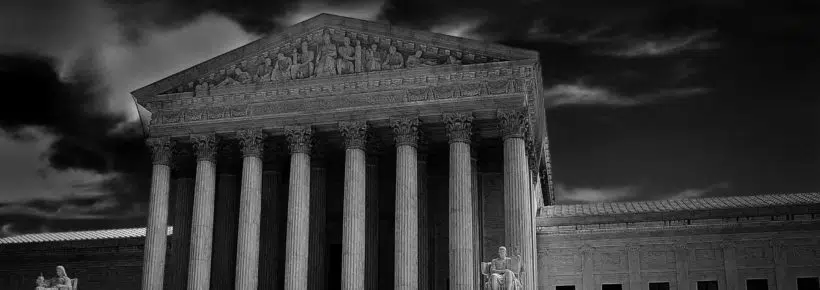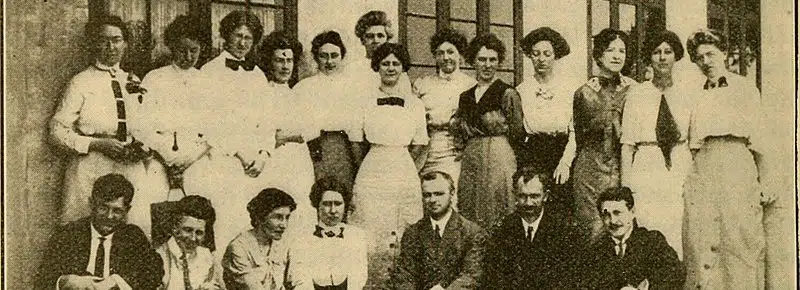The eugenic movement, therefore, cannot be a short campaign like many political or social movements. It is, rather, like the founding and development of Christianity, something to be handed on from age to age.
~ “Report of the President of the American Eugenics Society, Inc.,” 1926.
As this short history of the eugenics movement shows, eugenicists have always been associated with bigotry, racism, and elitism while working in favor of wealthy white people.
How Eugenics Grew from Darwinism
In 1798, the Rev. Thomas Robert Malthus published An Essay on the Principle of Population as It Affects the Future Improvement of Society. This short work stressed that the human population was growing at a geometrical rate, but food production was only growing at an arithmetic (straight-line) rate. This meant that, sooner or later, widespread starvation and famine would occur, resulting in a catastrophic collapse in the human population. As the following ninety-second video explains, Malthus’ reasoning was faulty.
This idea was argued in academia and in other milieu for several decades. For example, Charles Dickens’ character Ebenezer Scrooge presented Malthus’ ideas in his novella The Christmas Carol.
The debate over the possibility of an inevitable food shortage reached a full boil when Charles Darwin set the scientific world on its ear in 1856 by publishing On the Origin of Species, which set forth for the first time a coherent explanation of the theory of evolution. In his preface, Darwin stated that evolution was “an application of the theories of Malthus to the entire animal and vegetable kingdom.” Darwin stated that his “theory of natural selection” ― why some species endured as others disappeared ― was based on Malthus’ mathematical theories.
In 1871, Darwin extended this thesis in his book The Descent of Man. He stated that humanity would see some of the weaker races reduced in number or even wiped out by natural selection in the form of famine, diseases, war, and other influences, while the stronger races would survive and thrive.
Francis Galton: Father of Eugenics
Francis Galton, a cousin of Charles Darwin, coined the term “eugenics” in 1883, a derivation of the Greek “good birth” (it is no coincidence that the term “euthanasia,” the control of death, is derived from the Greek “good death”). Galton described eugenics as “the science of improving [human] stock…to give the more suitable races a better chance of prevailing speedily over the less suitable.”1 He founded the Eugenics Society in 1907, whose purpose was “to spread eugenic teaching and bring human parenthood under the domination of eugenic ideals.”2
Galton’s new science, which came to be known as “Social Darwinism,” held that the struggle for existence in society and evolution would inevitably lead to the “fittest” races achieving domination over the “less fit.”
In 1869, Galton had published his work Hereditary Genius, in which he wondered if it might be possible to produce geniuses by inbreeding the upper classes through several generations, while sequestering the “less desirable elements” in monasteries, convents, and institutions, a combined program of both positive and negative eugenics.
Galton held the popular view that the naturally occurring evolution of the human race was being thwarted by philanthropy directed towards “undesirable” segments of the population. He proposed allowing Darwin’s “natural selection” to operate more freely without interference by society, and, further, combining it with human-engineered “artificial selection” in order to accelerate the evolution of the human race.
Galton’s desire to eliminate these “undesirable” portions of humanity remains at the core of the eugenics movement until this day, as we shall see.
Bigotry from Eugenicists
One of the first tasks at hand for the new eugenicists was to cut off, as far as possible, aid to the poor so that natural selection could once again do its work.
Margaret Sanger, in her book Pivot of Civilization, stated:
Such philanthropy, as Dean Inge has so unanswerably pointed out, is kind only to be cruel, and unwittingly promotes precisely the results most deprecated. It encourages the healthier and more normal sections of the world to shoulder the burden of unthinking and indiscriminate fecundity of others; which brings with it, as I think the reader must agree, a dead weight of human waste. Instead of decreasing and aiming to eliminate the stocks that are most detrimental to the future of the race and the world, it tends to render them to a menacing degree dominant.3
Galton believed in the power of religion to move men’s souls and minds, so he proposed that eugenics evolve from a hard science into national policy and eventually into a religion.4 The American Eugenics Society even published a “Eugenics Catechism for Clergymen,” which outlined the tenets and dogmas of this new religion.5
Atheist and racist Julian Huxley was the most important strategist of the early twentieth-century eugenics movement. He was the first Director-General of the United Nations Educational, Scientific, and Cultural Organization (UNESCO) and President of the English Eugenics Society. He also founded the World Wildlife Fund (WWF), and was a member of both the British Euthanasia Society and Great Britain’s Abortion Law Reform Association (ALRA). His grandfather, Thomas Henry Huxley, was a leading advocate of Darwin’s theories. His brother Aldous was the famous New Age psychedelic drug lobbyist.6
Julian Huxley seconded Galton’s view that eugenics should eventually “evolve” into a religion:
I find myself inevitably driven to use the language of religion, for the fact is that all this does add up to something in the nature of a religion: perhaps one might call it Evolutionary Humanism. The word “religion” is often used restrictively to mean belief in gods; but I am not using it in this sense…. I am using it in a broader sense, to denote an overall relation between man and his destiny, and one involving his deepest feelings, including his sense of what is sacred. In this broad sense, evolutionary humanism, it seems to me, is capable of becoming the germ of a new religion, not necessarily supplanting existing religions but supplementing them.7
One of the foremost eugenicists of the first half of the twentieth century is known to almost all pro-lifers as the founder of the Planned Parenthood Federation of America (PPFA) ― Margaret Sanger. Her journal The Birth Control Review, along with her many books, features hundreds of examples of racist and eugenicist thinking, culminating in her 1932 “Plan for Peace.” In light of all of these racist and eugenicist statements, it is astounding that Planned Parenthood continues to deny that Margaret Sanger had a “program” for “Negroes.”
American eugenicists confined themselves primarily to theorizing and philosophizing until the early 1920s, when state and local governments began to “try out” (purely for academic or fiscal reasons, of course) some of their more apparently innocuous schemes. These plans naturally targeted those who had the weakest voices, the poor and the institutionalized. The eugenicists soon found the simplest and most effective way of preventing the “less desirable classes” from reproducing ― widespread involuntary surgical sterilization.
Famous New York urologist William Robinson was certainly not unique in his view that “it is the acme of stupidity to talk in such cases of individual liberty, of the rights of the individual. Such [unfit] individuals have no rights. They have no right in the first instance to be born, but, having been born, they have no right to propagate their kind.”8 And this disgustingly arrogant attitude within the eugenics movement would find even more extreme measures….
The Beginning of Nazi Eugenics
Adolf Hitler was personally fascinated by the American eugenics program, and at one point said:
Now that we know the laws of heredity, it is possible to a large extent to prevent unhealthy and severely handicapped beings from coming into the world. I have studied with great interest the laws of several American states concerning prevention of reproduction by people whose progeny would, in all probability, be of no value or be injurious to the racial stock. I’m sure that occasionally mistakes occur as a result. But the possibility of excess and error is still no proof of the incorrectness of these laws.9
In the early 1930s, a number of leading German academics began to lay the foundation of thought and theory that would soon culminate in the mass elimination of the “unfit,” and ultimately the Holocaust. For example, Halle University’s Professor Doctor Karl Kürtner pioneered the first German university course on “race hygiene for physicians.” He based it on “the American pathfinders Madison Grant and Lothrop Stoddard” — Stoddard being, of course, the author of The Rising Tide of Color against White World-Supremacy and a board member of Margaret Sanger’s American Birth Control League for a decade. Kürtner also explained that he used American racial and eugenic legislation as a model for the German extermination program.10
By 1935, leading American geneticist Hermann J. Muller complained that the legitimate aspects of the science of eugenics had been “hopelessly perverted into a cult for advocates for race and class prejudice, defenders of vested interests of church and state, Fascists, Hitlerites, and reactionaries generally.”8 He was right: if there was ever any ethically sound eugenics which focused simply on improving the overall health of the human race, it has been entirely taken over by bigots who want all non-whites and all poor classes eliminated.
Conclusion
Of course, Britain, the United States, and Germany were not the only nations to violate their citizens’ rights on a vast scale through enforced eugenic sterilization. As shown in the history of the world eugenics movement, Japan, Sweden, Finland and other nations enacted and enforced draconian sterilization measures on their most helpless citizens.
The eugenics movement is not an aspect of American history that we should be proud of. Why are we supporting those who continue to propagate eugenics (such as Planned Parenthood), when we ought to be exposing the injustice of the abortion industry toward the poor and racial minorities?
+ Endnotes
[1] Francis Galton. Inquiries into Human Faculty. London: Macmillan, 1883, page 25.
[2] Francis Galton. Memories of My Life. London: Melhuen Publishers, 1908.
[3] Margaret Sanger. The Pivot of Civilization. New York: Brentano’s, 1922. See especially Chapter V, “The Cruelty of Charity.” Sanger condemns philanthropy repeatedly in this book. She writes:
The curious situation has come about that while our statesmen are busy upon their propaganda of “repopulation,” and are encouraging the production of large families, they are ignoring the exigent problem of the elimination of the feeble-minded. In this, however, the politicians are at one with the traditions of a civilization which, with its charities and philanthropies, has propped up the defective and degenerate and relieved them of the burdens borne by the healthy sections of the community, thus enabling them more easily and more numerously to propagate their kind. [pages 82 and 83]
But there is a point at which philanthropy may become positively dysgenic, when charity is converted into injustice to the self-supporting citizen, into positive injury to the future of the race. Such a point, it seems obvious, is reached when the incurably defective are permitted to procreate and thus increase their numbers. [page 99]
My criticism, therefore, is not directed at the “failure” of philanthropy, but rather at its success. These dangers inherent in the very idea of humanitarianism and altruism, dangers which have today produced their full harvest of human waste, of inequality and inefficiency, were fully recognized in the last century at the moment when such ideas were first put into practice. Readers of Huxley’s attack on the Salvation Army will recall his penetrating and stimulating condemnation of the debauch of sentimentalism which expressed itself in so uncontrolled a fashion in the Victorian era. [pages 108 and 109]
The effect of maternity endowments and philanthropy would have, perhaps already have had, exactly the most dysgenic tendency. The new government program would facilitate the function of maternity among the very classes in which the absolute necessity is to discourage it. Such “benevolence” is not merely superficial and near sighted. It conceals a stupid cruelty, because it is not courageous enough to face unpleasant facts. Aside from the question of the unfitness of many women to become mothers, aside from the very definite deterioration in the human stock that such programs would inevitably hasten, we may question its value even to the normal though unfortunate mother. [page 115]
[4] Francis Galton. “Eugenics, Its Definition, Scope and Aims.” Sociological Papers. London, 1905.
[5] “Eugenics Catechism for Clergymen,” prepared by the Committee on Cooperation with Clergymen of the American Eugenics Society. Advertised among other publications in the “Report of the President of the American Eugenics Society, Inc.,” June 26, 1926, page 25.
[6] Julian Huxley wrote:
The negro mind is as different from the white mind as the negro body from the white body. The typical negro servant, for instance, is wonderful with children, for the reason that she really enjoys doing the things that children do…. You have only to go to a nigger camp-meeting to see the African mind in operation ― the shrieks, the dancing and yelling and sweating, the surrender to the most violent emotion, the ecstatic blending of the soul of the Congo with the practice of the Salvation Army. So far, no very satisfactory psychological measure has been found for racial differences; that will come, but meanwhile the differences are patent…. [intermarriage between the] negro and Caucasian type…gives rise to all sorts of disharmonious organisms…. By putting some of the white man’s mind into the mulatto, you not only make him more capable and more ambitious (there are no well-authenticated cases of pure blacks rising to any eminence), but you increase his discontent and create an obvious injustice if you continue to treat him like any full-blooded African. The American negro is making trouble because of the American white blood that is in him.
Julian Huxley. “America Revisited III. The Negro Problem.” The Spectator, November 29, 1924.
[7] Julian Huxley. Evolution in Action. New York City: Signet, 1957, page 132.
[8] Gregory E. Pence, M.D. Classic Cases in Medical Ethics: Accounts of the Cases That Have Shaped Medical Ethics, with Philosophical, Legal, and Historical Backgrounds. New York City: McGraw-Hill Publishers, 1990. Chapter 14, “Preventing Undesirable Teenage Pregnancies,” pages 286 to 302.
[9] Adolf Hitler, quoted in Otto Wagener. Hitler aus nächster Nähe: Aufzeichnungen eines Vertrauten 1929-1932, edited by Henry A. Turner. Frankfurt am Main: Ullstein, 1978, page 264.
[10] “Reich Opens Race Study: Halle University Course Said to be Based on American Models.” The New York Times, August 2, 1933
William McDonald revealed that Grant openly advocated for the establishment of a “Nordic, Protestant America” in his review of Grant’s book The Conquest of a Continent, or the Expansion of Races in America [New York City: Charles Scribner’s Sons, 1933]. This book featured a foreword by prominent eugenicist and racist, Professor Henry Fairchild Osborn.
Related Content
Dr. Brian Clowes has been HLI’s director of research since 1995 and is one of the most accomplished and respected intellectuals in the international pro-life movement. Best known as author of the most exhaustive pro-life informational resource volume The Facts of Life, and for his Pro-Life Basic Training Course, Brian is the author of nine books and over 500 scholarly and popular articles, and has traveled to 70 countries on six continents as a pro-life speaker, educator and trainer.















This is a one-sided account. It is possible completely to oppose abortion but also advocate genetic counselling and birth-control to reduce the infliction of hereditary illness upon children. Catholic moralists have supported the promotion of larger numbers of gifted children, and segregation for psychopathic recidivist criminals. Also, there are differences between races, and the issue of hybrid depression is a matter of medical science which is compatible with Christianity.
One sided?